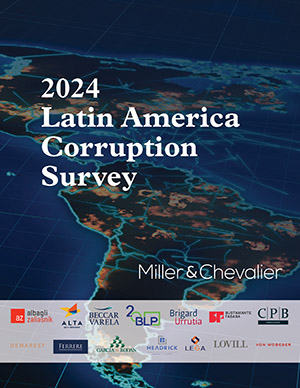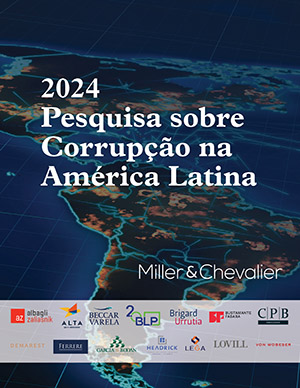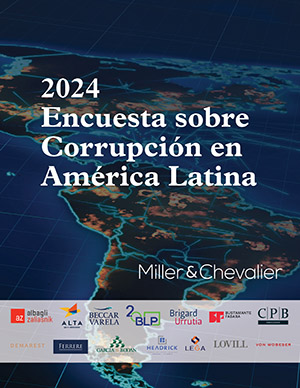Corporate Compliance – Not Enforcement – Is Combatting Pervasive Corruption in Latin America, Miller & Chevalier Research Finds
Washington, DC, April 2, 2024 – Corruption remains pervasive throughout Latin America despite sustained efforts to criminalize, investigate, and prosecute misconduct, according to new survey data. In fact, corporate compliance – not enforcement – is the key driver for addressing these endemic issues.
The 2024 Latin America Corruption Survey, released today by Miller & Chevalier Chartered and 14 collaborating law firms in Latin America, measures perspectives on how corruption impacts companies' ability to do business in the region. The report, which builds on previous surveys dating back to 2008, reveals that nearly half of all respondents view corruption as a significant obstacle to doing business – and less than a third say the U.S. Foreign Corrupt Practices Act (FCPA) or other anti-corruption laws significantly mitigate corruption risk.
"Having tracked this data for 15 years, the results cannot be more clear – businesspeople working in Latin America consistently perceive significant corruption risk in their operations; this, despite significant efforts over the last 10 years to strengthen local anti-corruption laws," said Matteson Ellis, Miller & Chevalier's Latin America Practice Lead. "Nonetheless, in the absence of consistent enforcement, executives in the region are confronting this pervasive problem. Eighty percent of survey respondents report that their companies are taking action to protect against corruption risk, while 56 percent say that dealing with corruption risk is a top priority for their organizations."
Survey results show that more companies are adopting increasingly refined compliance strategies. Relatedly, countries with the most substantive compliance incentives embedded in local laws have seen some positive changes.
Corporate Compliance is Key
Through effective compliance programs, companies can reduce the risk of corruption and misconduct in their organizations. Most respondents (nearly 80 percent) have basic compliance program elements in place, which include anti-corruption policies, contract terms, training, and procedures for gifts, travel, and entertainment.
This year's survey saw even more progress on this front.
"For the first time, we are now seeing a majority of companies implement more nuanced elements to their compliance programs – an encouraging development that underscores how seriously companies take corruption risk," said Alejandra Montenegro Almonte, Chair of Miller & Chevalier's International department. "Between 65-75 percent of respondents now say their companies have anonymous reporting mechanisms, full-time compliance personnel, anti-corruption audits and assessments, and compliance procedures in place for charitable and community donations, political contributions, facilitating payments, and M&A due diligence."
The findings also reveal that companies are increasing efforts to address the risks posed by third parties. Seventy-four percent of respondents are adopting some kind of due diligence processes to evaluate third parties, up from 64 percent in 2020.
On the other hand, respondents continue to report third party monitoring as a challenging area of their compliance programs. While more companies are actively monitoring their third parties – 57 percent are doing this in 2024 compared to 43 percent in 2020 – the frequency continues to trail implementation efforts for other compliance elements.
Impact of Anti-Corruption Laws Remains Uncertain
Encouragingly, respondents report anti-corruption laws are more effective than they were in 2020, with 40 percent saying the measures are effective in the country in which they work, compared to 30 percent in 2020. Only about a quarter (26 percent) think the laws are not effective at all, compared to 37 percent who answered similarly in 2020.
Over the last 10 years, several jurisdictions – Argentina, Brazil, Chile, Colombia, Costa Rica, Ecuador, Mexico, and Peru – modified their anti-corruption laws, and the measures appear to have some impact. More respondents from these regions believe that an offender will be prosecuted compared to 2020.
"In contradiction to these data points, the number of respondents who say that enforcement of the FCPA and other anti-corruption laws has helped mitigate corruption has declined," said James G. Tillen, a Member in the firm's Latin America practice. "This contradiction in the data, combined with our experience working in these regions, underlines the finding that respondents put more faith in corporate compliance programs to combat corruption."
Country-Specific Findings
The data from several countries was significant enough to be analyzed on its own, and the report spotlights notable findings from Argentina, Brazil, Chile, Colombia, Mexico, Peru, the U.S., and Venezuela.
For example, Venezuela, Nicaragua, and Bolivia are seen as the three most corrupt countries surveyed for doing business, while the U.S., Uruguay, and Chile are seen as the three least corrupt.
Survey data shows a high degree of pessimism in Brazil related to current anti-corruption enforcement, growing corruption risk in Colombia, a lack of trust in prosecution services in Mexico, and a deteriorating enforcement climate in Peru. Chile, on the other hand, appears to be a success story, with more awareness of enforcement and a view that local anti-corruption laws are effective. Data also suggests a lag in attention to corporate compliance in the U.S., possibly due to lukewarm FCPA enforcement in recent years. "The country-specific data in the survey can be of great use to companies' corporate compliance efforts, as it provides empirical bases for assessing corruption risk and deploying compliance resources in the region. The data even highlights which government bodies within particular countries are seen as particularly corrupt," said International Member Gregory W. Bates.
Of note, sample sizes from El Salvador and Nicaragua were so small they were statistically insignificant, whereas the 2020 survey respondent numbers were significant, which suggests that the political climate in these jurisdictions is worsening.
Additional Survey Highlights
This year's report distills insights from more than 1,000 professionals throughout Latin America and the United States and builds on findings from our surveys in 2008, 2012, 2016, and 2020. Respondents represent numerous industries and types of companies, from publicly traded multinational corporations to local and regional companies, and include lawyers, risk directors, compliance officers, and a range of other senior executives.
A few additional key findings include:
- The majority of respondents in over half the countries surveyed believes their companies have lost business to competitors that have made illicit payments.
- Three-quarters of all respondents say they are aware of prosecutions of individuals, companies, or government officials for making or receiving improper benefits, an improvement over prior years surveyed.
- Forty percent say anti-corruption laws are effective in the country where they work to either a moderate (30 percent) or significant (10 percent) extent — up 10 percentage points from 2020.
- Six in 10 respondents believe their companies will increase efforts to prevent corruption in the next 12 months.
- Forty-nine percent perceive significant corruption within the judicial branch of their home country's government, while 41 percent said the same about corruption within prosecution services or investigations.
- When asked to what extent FCPA enforcement or other anti-corruption laws help mitigate corruption risk, the number of Americans who responded "to a significant or moderate extent" has declined from 75 percent in 2020 to 67 percent in 2024.
A full copy of the survey results and analysis is available in English, Spanish, and Portuguese.



Click to download the full survey reports in English, Portuguese, and Spanish.
About Miller & Chevalier
Founded in 1920, Miller & Chevalier is a Washington, DC law firm with a global perspective and leading practices in Tax, International Law, Litigation, ERISA, White Collar Defense and Internal Investigations, Government Contracts, and Government Affairs. Miller & Chevalier is a top-ranked firm sharply focused on targeted areas that interact with the federal government. A significant number of firm lawyers have held senior positions in the U.S. government and have written many of the regulations they currently help clients navigate. For more information on the firm, visit www.millerchevalier.com.
###
CONTACT:
Julie Merkin, Director of Marketing, jmerkin@milchev.com, 202-661-5413